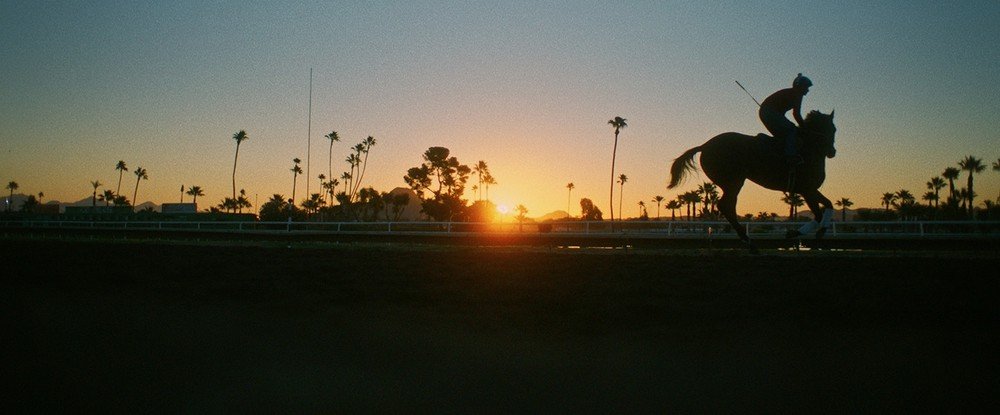Jockey (2021)
Directed by Clint Bentley
Monotonous and hauntingly pedestrian, Clint Bentley’s Jockey is the latest in a glut of films about men and their horses. These equine-centric films of the past five years – in preferential order: Chloe Zhao’s The Rider, Andrew Haigh’s Lean on Pete, and Laure de Clermont-Tonnerre’s The Mustang – contextually aim to deconstruct a brooding, brutish masculine type by examining their relationships with their horses. Or something like that. There’s a lot of faux-lyricism to these films that I struggle with, and none were more difficult to believe than Jockey.
Jackson Silva (Clifton Collins Jr.), an aging jockey, is first introduced as a man on his last legs. The litany of injuries that he’s endured during his career have caught up with him, and when meeting with the horse veterinarian (the assumption is that he’s too destitute to see a real physician), he’s told that he needs to stop. The prevailing analog here is Darren Aronofsky’s The Wrestler, a superior and formally more adventurous film about an aging athlete forced to confront age through the lens of his body failing him. Believing that he can still make it for the rest of the season, he promises his handler to ride a fledgling horse in an upcoming race. Meanwhile, Jackson is confronted by Gabriel (Moises Arias), a novice jockey, who suggests that he may in fact be his son. Jackson meets the news with a degree of skepticism but eventually agrees to take the kid on as a mentee. Their relationship flourishes even if their actual connection remains something of a question mark for much of the film’s runtime.
Among the numerous issues that plague Clint Bentley’s film, it’s the overarching sense that this is a hodgepodge of different, ultimately better, films. At times Jockey resembles the sort of matter-of-fact candor you’d find in a John Sayles film. The mentor-mentee relationship between Gabriel and Jackson begs comparison to Paul Thomas Anderson’s Hard Eight or even Paul Schrader’s 2021 film The Card Counter. But all these analogs and comparisons serve to highlight the relative inadequacies of Bentley’s film – these parities motivate you to want to watch those other films and not the one that he produced. Which is unfortunate given the paltry of rewards that the film provides, whether it’s the rare opportunity to see journeyman actor Clifton Collins Jr. finally featured in a leading role or Adolpho Vleso’s vivid cinematography; but the material here is an exercise in rote indie tropes that lead nowhere.

